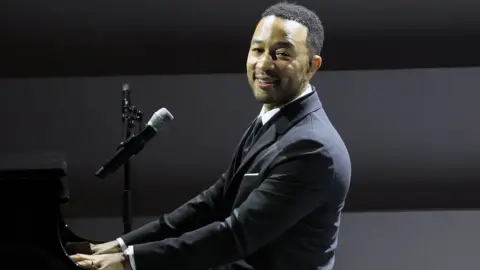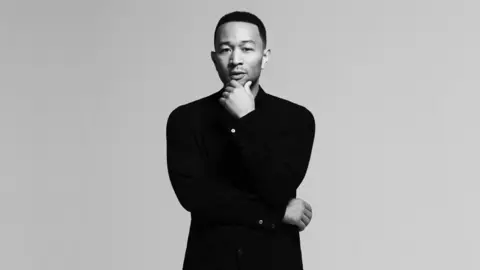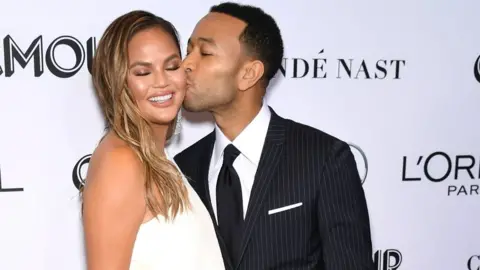John Legend: Grammys boycott 'doesn't fix the problem'
 Getty Images
Getty ImagesOn Tuesday night, John Legend headlined a Motown tribute concert, celebrating the record label's 60th anniversary.
Alongside Smokey Robinson and Stevie Wonder, the star performed a selection of Marvin Gaye hits, including the timeless, socially-conscious soul anthem What's Going On?
"I've always been inspired by Marvin Gaye," says Legend, on the phone from his home in LA the following morning.
"He showed us that activism can be part of your art; and that art can inspire other people's activism."
It's a lesson the 40-year-old has applied throughout his career, most notably on the 2010 album, Wake Up, which resurrected and reframed protest songs from the 60s and 70s for a modern audience.
Today, he releases a protest song of his own, Preach, that was inspired by the onslaught of negative news coming out of America - gun violence, bigotry, child separation, police brutality.
"Get home every evening and history's repeating," he sings, over minor-key organ chords. "Turning off my phone cause it's hurting my chest."
"It's stressful to read the news sometimes," says the singer. "Sometimes we can get so frustrated and throw up our hands, and it's important that we realise we can actually do something."
The song's chorus - "I can't sit and hope / I can't just sit and pray" - is directly targeted at US politicians, and their reluctance to tackle the country's gun laws.
"Every time there's a gun massacre in America, which is way too often, politicians come out and say, 'We send our hopes and prayers to the victims and their families' and then they don't do anything about it," he says.
"So the song is basically a rebuke of the people in power.
'Change can happen'
"If you look at any polls, there's only a small minority that are against background checks, a small minority that are against other regulations. We're looking at 80 or 90% approval on a lot of these provisions. So it really is the politicians who are lagging behind the people."
"But then, that gets to the whole problem with our system, that moneyed interests and lobbyists and corporations carry more weight with politicians than the people do, too often, and we need to change that too."
"The gun problem is insane, it's radical and it's terrible."
In the song's refrain, Legend sings, "I try to do the things / I say that I believe / I can't just preach, baby, preach"; and the star says he was "directly inspired" by the survivors of Parkland school shooting a year ago - especially Emma Gonzalez and David Hogg, who have campaigned for background checks and challenged America's powerful gun lobby.
"This is really a tribute to their activism," says Legend, who accepts that Preach won't move the dial on the issue of gun ownership.
"I don't know that a song would ever convince someone to change sides," he admits, but stresses the importance of "using my career to fight for justice".
"It's a tough time but I'm also optimistic we can make change happen. I've been a part of that before and I think it's possible for us to do it again."
 Eliot Lee Hazel
Eliot Lee HazelThe star's own activism has focused on prison reform. He's played a part in establishing two charities - FreeAmerica and Unlocked Futures - which support former prison inmates; and campaigned for Florida's Amendment 4, which restored voting rights to former felons (Legend's own mother was jailed several times during his childhood for drug-related problems).
Along with his wife, Chrissy Teigen, he donated $288,000 to the American Civil Liberties Union (ACLU) in honour of Donald Trump's 72nd birthday last June. And he's also contributed to films such as 12 Years A Slave and Selma, which document the turbulent history of black America.
His parallel careers in film, music and TV work have helped the star become an EGOT - one of only 15 people who've won a competitive Emmy, Grammy, Oscar and Tony award.
"Did I get a laminated card? No!" he laughs. "A few of my friends jokingly sent me little trophies; but there's no official EGOT Academy or anything."
 Getty Images
Getty ImagesUnusually, the star skipped Sunday's Grammys ceremony in LA - although not because of any dispute with the Recording Academy ("John got an EGOT and egot lazy," his wife tweeted).
So what does he make of artists like Childish Gambino, Kendrick Lamar, Jay Z and Kanye West deciding to boycott the ceremony?
"Historically, the Academy's had a problem with hip-hop [so] I understand the impulse to withdraw and not participate and say, 'this is all bullshit' but of course that doesn't fix the problem," he says.
"I would love for the solution to be that we, as younger artists, as artists in the hip-hop community, got more involved and make up a larger bloc of the votes, so the music we make gets its proper dues.
"But I also understand the reactions of people that say, you know, 'screw it, I don't want to show up.'
"It's a conundrum."
Sunday's awards saw Childish Gambino win song of the year and record for the year for This Is America - the first time a rap song has won either category.
"Honestly, I was surprised," says Legend. "I didn't think that was going to happen. But I was happy at the same time. I think that's a big deal."
"Maybe it will encourage more artists to say, 'maybe the Grammys aren't so bad after all' and actually get involved."

Follow us on Facebook, on Twitter @BBCNewsEnts, or on Instagram at bbcnewsents. If you have a story suggestion email [email protected].

